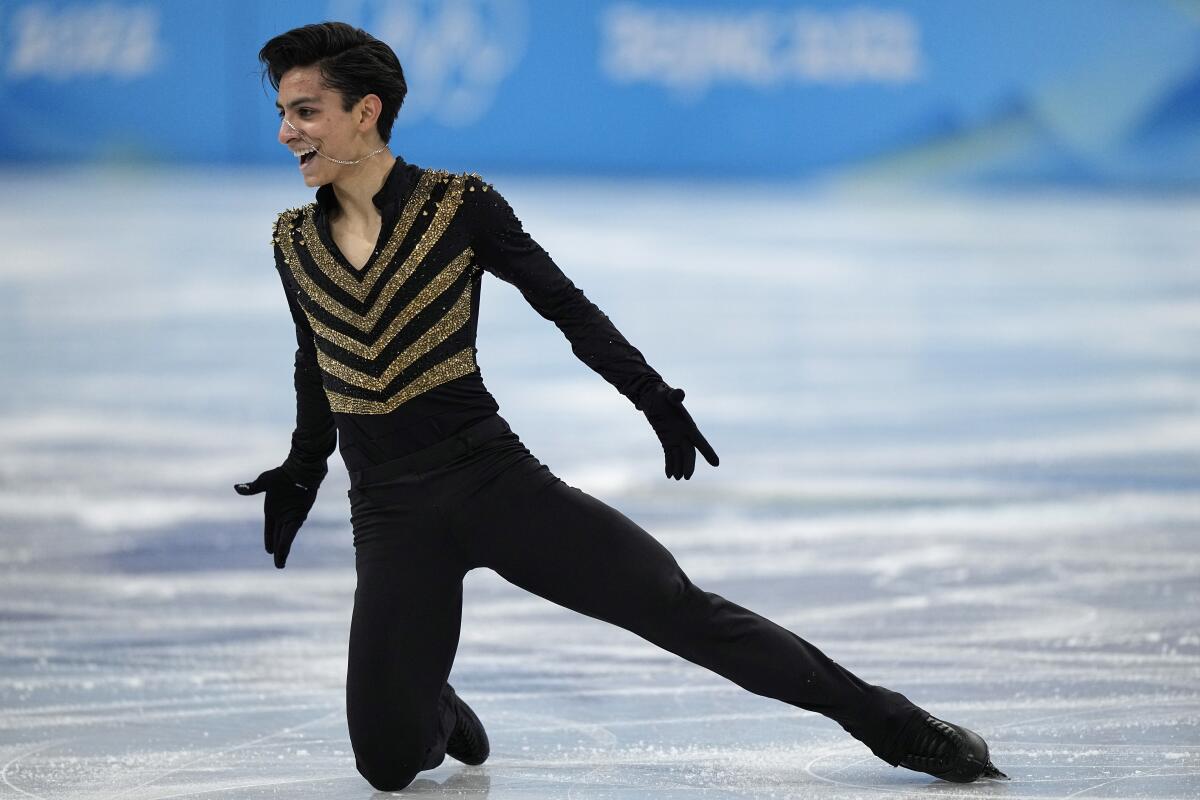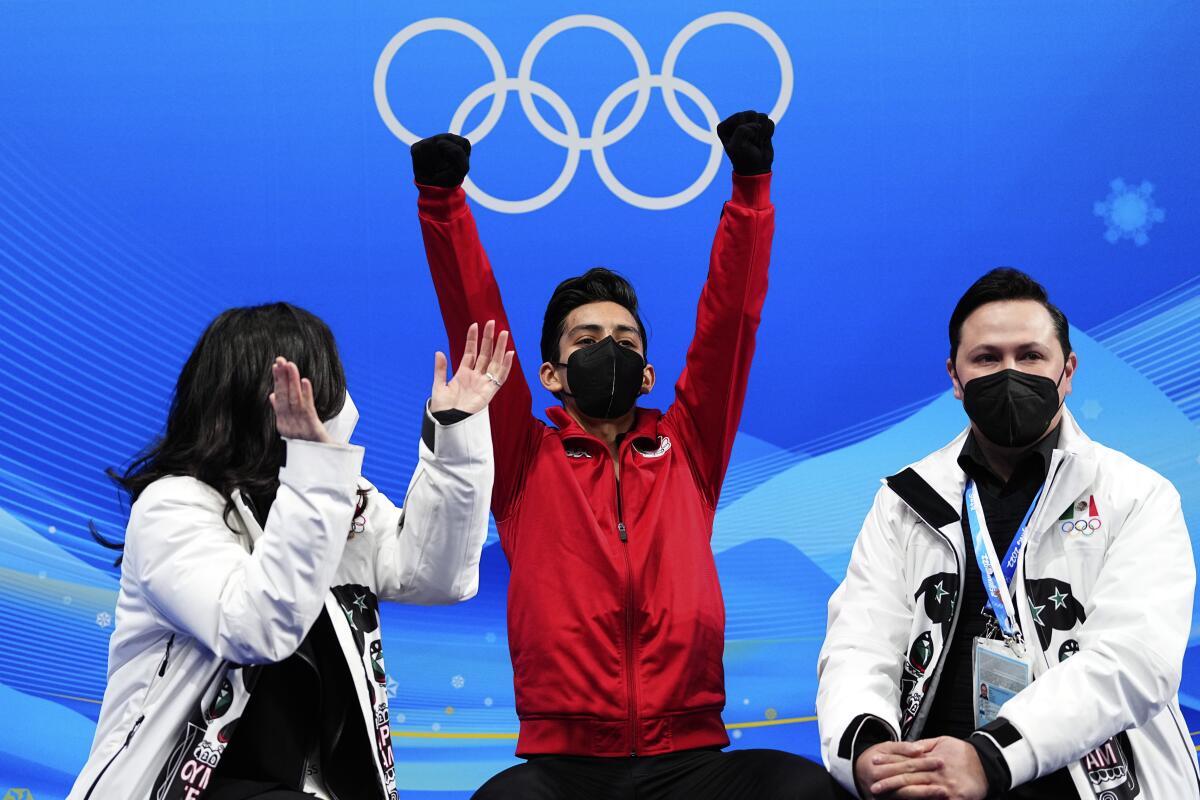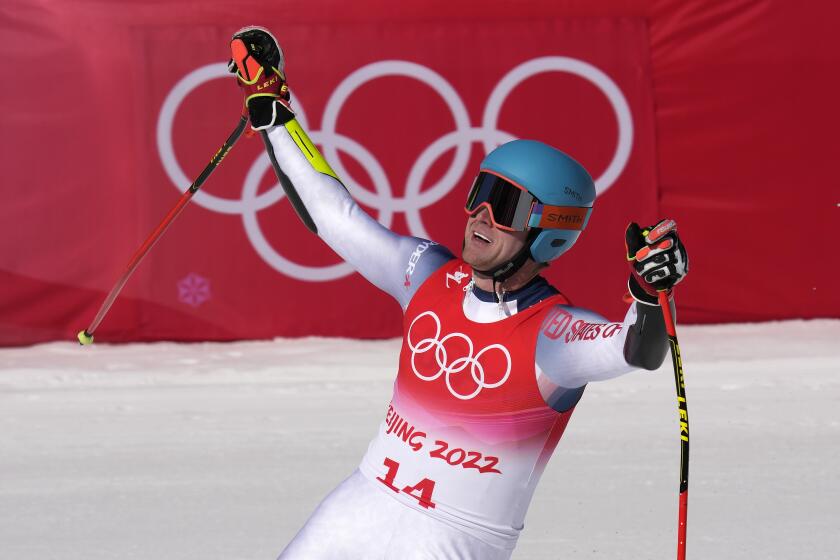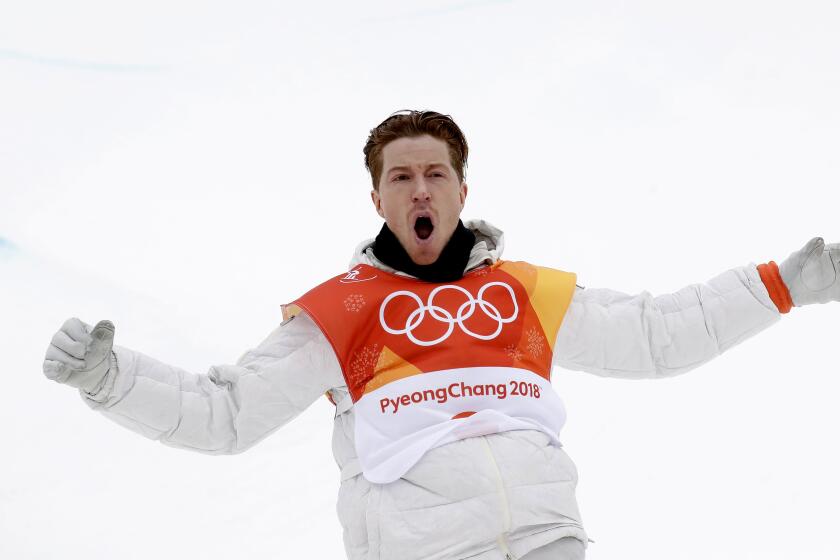Mexico’s Donovan Carrillo giving Latin America hope and excitement in ice skating

Donovan Carrillo might have been in Beijing, but his image was all over Mexico on Tuesday morning.
There he was smiling as he knelt on the ice in a full-page photo behind the headline ¡Mágico! in the Mexico City daily Reforma. “His Dream Comes True” shouted El Norte, Monterrey’s leading newspaper, alongside a photo of a smiling Carrillo gliding across the ice. “Makes History” said the tabloid Esto below a cover photo of — what else? — a smiling Carrillo, balancing on one skate on the ice at the Winter Olympics.
The Mexican media hasn’t featured that much ice since Disney’s “Frozen” opened in the country nearly a decade ago. But then when you’re a big underdog on a global stage, the whole world cheers for you.
And few winter athletes came to Beijing as bigger underdogs than Carrillo, 22, who made history Monday by becoming the first Latin American male skater to advance to the free skate in an Olympic Games.
His mother, Diana Isela Suazo, had to watch from her home in Guadalajara because of China’s strict COVID-19 protocols. In fact, she didn’t even get the day off work.
But she celebrated just as proudly.
“I am grateful for the positive response and love that has been given to Donovan and Goyo’s work,” she said, including her son’s coach, Gregorio Núñez, in her thoughts after clocking out Tuesday. “This is the culmination of a life of effort and mutual sacrifice that is finally paying off.”
Ryan Cochran-Siegle, whose best finish was 11th, is a surprise silver medalist in the super-G, almost a year after he had surgery for a broken neck.
It’s the latest chapter in an improbable, quixotic tale as well, one that involved far more obstacles than it did successes.
When Carrillo was 13, the only rink in Guadalajara closed, forcing him to leave his family and follow his coach in the central Mexican city of León, where he trained on an undersized rink in a shopping mall, sharing the ice with toddlers teetering on rented skates and teenagers on dates.
In a country that hadn’t sent a skater to the Olympics in three decades, there is no tradition of participation in the sport. So equipment, funding and even understanding were hard to come by.
“People didn’t believe in me or in my sport,” Carrillo said. “People were laughing at me.”
Now the whole country is celebrating with him after his spirited 19th-place finish in Monday’s short skate qualified him for Wednesday’s long program, achieving the humble goal Núñez set for his skater coming into the Games.
“It’s amazing for us,” said Galaxy forward Javier “Chicharito” Hernández, another Guadalajara native and Mexico’s all-time leading goal scorer, who was among those cheering Carrillo. “That’s the beauty of it, when a lot of people in Mexico try new sports and try new, different passions. There’s always going to be the first time.
“It’s amazing that he’s putting our country on the top.”
That’s the beauty of it, when a lot of people in Mexico try new sports and try new, different passions. There’s always going to be the first time.
— Galaxy forward Javier “Chicharito” Hernández

Isadora Williams, who grew up in Virginia but competed for Brazil, is the only other athlete representing Latin America to reach the finals of an Olympic figure skating competition, finishing last in a 24-person field in 2018. So if Carrillo beats just one competitor Wednesday, he will make more history.
And if the world thought Carrillo’s first performance was joyful and inspired, wait until it sees what comes next.
Carrillo skated to two songs by Mexican American artist Carlos Santana in the short program, but he has expanded his playlist for the four-minute long program.
“It’s something Latin American,” Carrillo said. “My goal is to share my sport with all. Of course, in my country of Mexico, but at the same time I wanted to share my skating with all the Latin American people because we are very passionate. And I think we’re talented and hard workers.”
The result is an eclectic, upbeat soundtrack: the English-language “Perhaps, Perhaps, Perhaps” featuring Mexican crooner Carlos Rivera; Dean Martin’s 1954 classic “Sway”; and two songs featuring Puerto Rican singers, Ricky Martin’s “Maria” and “Bailar,” with Elvis Crespo and Mexican DJ Deorro.
“At some point, we could develop more athletes and more young skaters from Latin America,” Carrillo said. “This is a good way to motivate them and show them the sport.”
Snowboarding’s first crossover star looks to go out with a medal in his last races before retiring. His first Olympics was in 2006 in Torino.
As for his own Olympic experience, it might have come in an empty arena with his family watching on TV from 7,500 miles away, but in the end he made his country pay attention to a sport it didn’t know it cared about.
“I didn’t want it to end,” Carrillo said of his short program. “I wanted to keep skating and living the Olympic dream. For me to be qualified for the free skating, it’s like a dream come true.”
More to Read
Go beyond the scoreboard
Get the latest on L.A.'s teams in the daily Sports Report newsletter.
You may occasionally receive promotional content from the Los Angeles Times.










